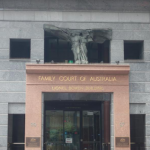It’s Time to Repeal Australia’s Discriminatory Transgender Laws

The majority of Australia’s same-sex marriage laws came into effect on December 9 last year, which meant LGBTIQ members of the community were finally able to get their partnerships legally solemnised as of January 9, due to the 30 day waiting period requirement after registering to marry.
But while marriage equality is now a reality for the overwhelming majority of society, it hasn’t fully been achieved. State and territory laws which force married transgender people who want to register a change of sex on their birth certificates to divorce, haven’t been revoked as yet.
Most jurisdictions in Australia still refuse to allow a transgender person to change the sex on their primary identity document if they’re married. These laws, which the UN has condemned as human rights violations, were put in place in order to prevent same-sex marriages.
The same-sex marriage bill did repeal subsection 40(5) of the Sex Discrimination Act 1984, which made it lawful to refuse to “alter an official record of a person’s sex” if they were married. However, this provision doesn’t come into force until December 9 this year.
So, this means Australian jurisdictions are under no obligation to make the required amendments until the end of the year, which has led Trans Health Australia to write to state and territory leaders, attorney generals and opposition leaders calling on them to make the changes as soon as possible.
The last vestige
“It is unfair and an injustice that one small category of people be made to wait any longer than necessary to win the marriage equality held by others,” Trans Health Australia spokesperson Zoey Campbell said.
According to Ms Campbell, trans people far too “often face discrimination in their daily lives.” And the removal of this “last hangover” of the “now obsolete prohibition on same-sex marriage” ought to be given “urgent attention,” especially as it’s in violation of international human rights standards.
“An incongruence between a birth certificate and gender presentation can often lead to administrative problems for trans people in dealing with government agencies and organisations,” Ms Campbell told Sydney Criminal Lawyers®. At the very least, this can lead to “abuses of privacy.”
Trans Health Australia wrote the letters in order to raise awareness of the issue, and to ensure that it doesn’t “get lost in the cracks.” As Ms Campbell explains, “being a small stigmatised community we are all too used to legislative reforms important to our welfare being deferred.”
Laws across the nation
The Transgender (Anti-Discrimination and Other Acts Amendment) Act 1996 was passed by NSW parliament in June 1996. The legislation amended the state’s Anti-Discrimination Act 1977 to make discrimination and vilification on transgender grounds unlawful.
The bill also amended the Births, Deaths and Marriages Registration Act 1995 to allow for a change of sex on a birth certificate. This can lawfully be done if an individual has their birth registered in NSW, is over the age of 18, has undergone gender affirmation surgery and is not married.
Only two jurisdictions in Australia allow married transgender people to change the sex on their birth certificate without getting a divorce. The ACT changed its laws in 2008, while the SA parliament passed the Births, Deaths and Marriages (Gender Identity) Amendment Bill in December 2016.
Ms Campbell, who lives in South Australia, said the local trans community “expressed great joy” over the changing of the law. “The amended certificate respects our privacy by not listing obsolete details,” she explained, adding, “we now have a birth certificate we can use without fear.”
Grace’s story
In 2011, a married transgender woman from NSW registered a complaint with the UN Human Rights Committee against the Australian government, after the NSW Births, Deaths and Marriages Registry repeatedly refused to change the sex on her birth certificate, due to her marital status.
The UN committee’s report outlined that for the purposes of the majority of Australian laws a person is treated as the sex recorded on their birth certificate. And the conflict between a person’s gender and the sex stated on that document can lead to incidents of discrimination and harassment.
In 2007, the woman, known as Grace, was issued with a passport stating she was female. The committee found it was incongruous of the government to prevent married individuals from altering their birth certificates, while allowing them to change the sex on their passport with relative ease.
International condemnation
The UN committee monitors the implementation of the International Covenant on Civil and Political Rights (ICCPR), which Australia ratified on August 13 1980. On March 17 last year, the committee ruled that Australian forced divorce laws are in violation of international human rights standards.
The laws breach two articles of the ICCPR. In requiring an individual to divorce in order to change their birth certificate, the committee found that this “constitutes arbitrary or unlawful interference with” their privacy and family, breaching article 17.
The law is also in violation of article 26 of the covenant, which outlines that an individual should not be discriminated against on the grounds of their marital status or gender identity.
A further grave violation
However, another major breach of human rights that continues in the majority of Australian jurisdictions is the requirement that transgender people must undergo gender affirmation surgery before they can alter the sex on their birth certificates.
Both the ACT and South Australia dropped this provision when they removed the requirement that a married transgender person must divorce in order to change their primary identity document.
Ms Campbell stated that “requiring surgery as a pre-condition for legal recognition of identity is a violation of Articles 16 and 17 of the ICCPR.” And these provisions in Australian laws violate the sexual orientation and gender identity human rights standards set out in the Yogyakarta Principles.
“Many in the transgender community may not have the financial means to pursue surgery or the health to undergo the procedure,” Ms Campbell continued. And she went on to point out that some simply “choose not to seek surgery.”
“A surgical requirement discriminates in a very practical way against such people,” she concluded.








